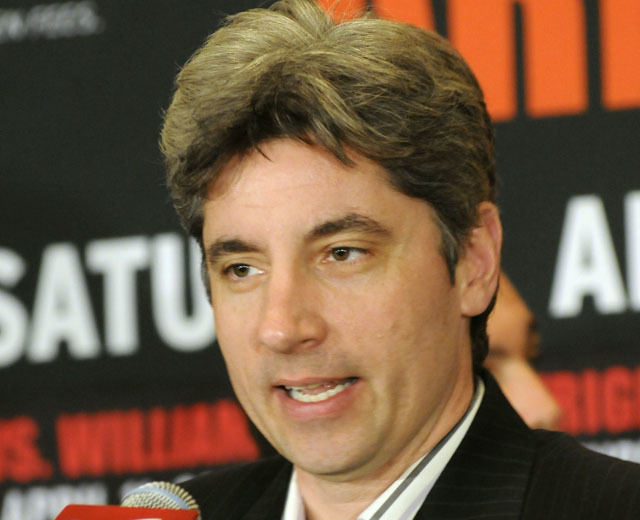Keith Kizer resigns as head of Nevada Athletic Commission
The Nevada Athletic Commission is looking for an executive director after Keith Kizer submitted his resignation Friday — much to the commission’s surprise.
Kizer, 47, is returning to the attorney general’s office. He had been in the office before serving as counsel to the athletic commission in 2001, leading to his being hired as executive director in 2006.
The resignation is effective immediately, though Kizer said he would be available to the commission for the next two weeks if needed.
The NAC said it will begin a national search immediately to replace Kizer, whose salary in 2013 was $95,000.
“I’ve enjoyed my time with the commission, but it’s time to move on,” Kizer said. “It’s time to go back to being an attorney.
“When they asked me to serve in 2006, it was with the idea of a five-year commitment. So I stayed a little longer, and I leave with no hard feelings.”
NAC chairman Francisco Aguilar said Kizer was not forced out.
“I was surprised,” Aguilar said. “I won’t deny there were some challenges, and we were working together to address those challenges. But I can assure you Keith was not pressured into his decision.”
Under Kizer’s watch, boxing and mixed martial arts enjoyed huge financial success in the state, bringing in more than $3 million in revenue for the general fund in each of the past three years.
Four of the 10 biggest boxing gates in Nevada history occurred during Kizer’s reign, including the No. 1 gate — $20.03 million on Sept. 14, when Floyd Mayweather Jr. and Saul “Canelo” Alvarez fought at the MGM Grand Garden.
In MMA, nine of the top 10 live gates took place with Kizer in charge, including the No. 1 gate of $6.9 million on July 7, 2012, when Chael Sonnen met Anderson Silva at the MGM.
Nevada’s drug testing and fighter safety regulations also grew more stringent during Kizer’s stewardship. Testing of all fighters for performance-enhancing drugs was escalated, and pre- and post-fight drug testing became the law in Nevada.
Instant replay also was instituted to determine if fouls resulted in fights having to be stopped. No boxer died in the ring under Kizer’s watch.
“I think that’s what I’m proudest of, our commitment to fighter safety and trying to keep drugs out of boxing and MMA,” Kizer said.
But Kizer also had his controversial moments, particularly in the past two years.
In June 2012, Manny Pacquiao lost a split decision to Timothy Bradley after Las Vegas judges C.J. Ross and Duane Ford scored the fight in favor of Bradley. Many fans and media at ringside thought Pacquiao had won easily.
The attorney general’s office looked into the scoring but found no wrongdoing. Still, Kizer took heat worldwide.
Kizer’s judgment again was called into question when he assigned Ross to work the Mayweather-Alvarez fight. Ross scored the fight a draw, resulting in a majority decision for Mayweather, even though he clearly dominated.
Ross took an indefinite leave of absence three days after the fight. But the controversial outcome led to changes in the vetting process Nevada uses to determine which judges and referees work championship fights.
There also was controversy involving Kizer’s selection of officials for MMA fights. Ultimate Fighting Championship president Dana White, who declined comment on Kizer’s resignation, often was critical of Kizer’s unwillingness to broaden the search for referees and judges. Most recently, the scoring of the Georges St. Pierre-Johny Hendricks fight in November drew White’s ire after St. Pierre was awarded a close decision.
Another hot-button issue has been the proliferation of therapeutic-use exemptions for testosterone replacement therapy throughout the sport. A few fighters have been granted TUEs by the NAC, and Kizer is leaving ahead of a looming debate with Vitor Belfort, a MMA fighter with a positive test who is likely to seek the use of TRT for a UFC middleweight title fight with Chris Weidman that is expected to be in Las Vegas this summer.
Kizer also was involved in controversial moments within the commission. Most notably, there was boxer Julio Cesar Chavez Jr.’s positive test for marijuana after his September 2012 loss to Sergio Martinez.
The commission fined Chavez $900,000, but it was reduced to $100,000 in June after Chavez’s attorneys went to court to seek relief. During the process, Kizer said he was powerless to offer input to the five commissioners.
Golden Boy promotions CEO Richard Schaefer said he will miss working with Kizer.
“It’s easy to criticize, but it’s not an easy job to do,” Schaefer said. “You look at Keith’s record, I thought he did a good job. He didn’t allow mismatches, and he put the safety of the fighters first.”
Reporter Adam Hill contributed to this story. Contact reporter Steve Carp at 702-387-2913 or scarp@reviewjournal.com. Follow him on Twitter @stevecarprj.






















